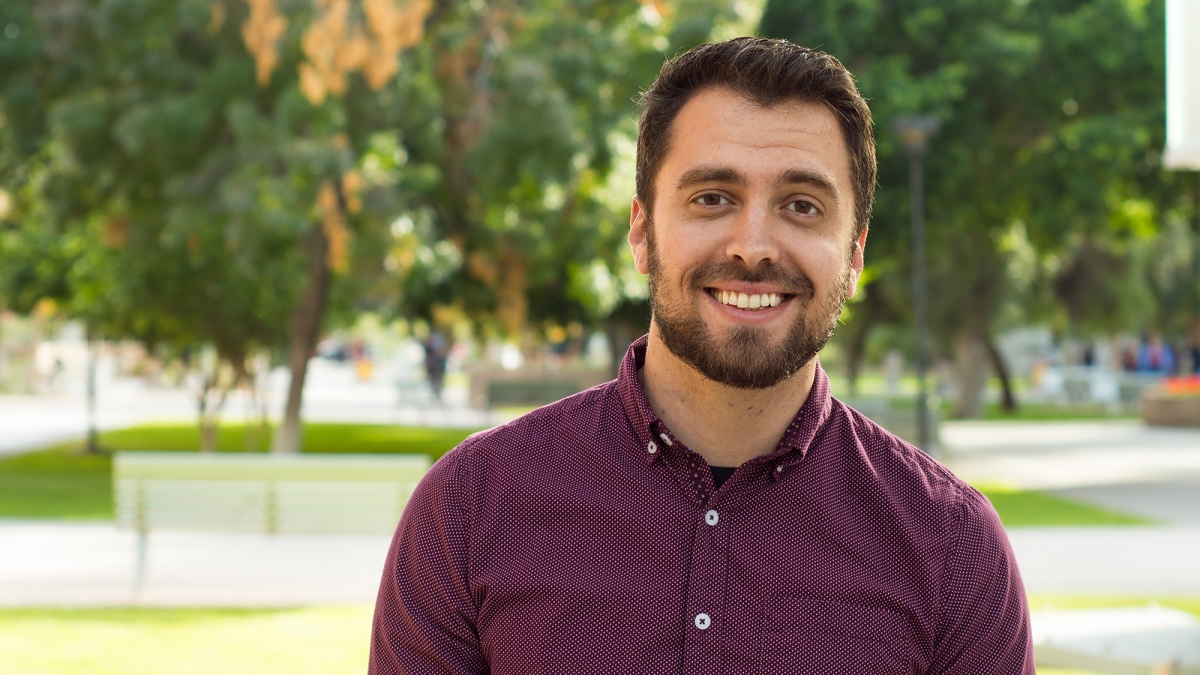ASU Letters and Cultures student wins Liberal Arts Dean’s Medal

Glenn Maur has received CLAS Deans Medal for his research into the literary legacy of Alexander the Great Photo provided by Tyler Kilbourne/ASU
Editor’s note: This is part of a series of profiles for fall 2016 commencement. See more graduates here.
The last award Glenn Maur received was in 8th grade, when his classmates declared him “Most Likely to Become a Street Musician.” Now, at 30 and graduating college, he has received the College of Liberal Arts and Sciences Dean’s Medal, which is just a little more prestigious.
Nominated for the Dean’s Medal by professor Mark Cruse, Maur earned the award for his thesis on Alexander the Great’s literary legacy across different languages and cultures.
Maur’s thesis is titled “The Many Roads to Babylon: The Thousand Year Legacy of the Sun and the Moon in the Greek, Latin, Arabic and Medieval European Vernacular Texts of the Alexander Romance.”
“Alexander is such a monumental figure in ancient studies,” Maur explained, “but he had a really pervasive legacy in medieval Europe, in Christian literature, and he also has a very important legacy in Islamic literature.”
Maur saw value in the stories surrounding Alexander, especially in the way different texts adapted his image. In Arabic works, including the Quran, Alexander is almost a religious figure called “The Master of Two Horns” who battles evil. French texts describe Alexander as a knight and Western conqueror, hosting banquets and setting an example for the Crusades.
Maur had the chance to present parts of his thesis at multiple conferences, including the ACMRS Conference, typically reserved for faculty and graduate students.
When Maur initially transferred to Arizona State University, he started work for his French major, but through the School of International Letters and Cultures he also studied Latin, ancient Greek, German and Arabic. For his honors thesis, he also worked with Old French, Old English, and Syriacc.
“If you like literature, if you like books, learning a foreign language is just really important,” Maur said. “It’s difficult, especially with the ancient languages. You’re trying to sound out these bizarre words that people haven’t actually spoken in a thousand years, but it forces you to look at the world in different way … it forces you to empathize with another time, another place, another culture. It makes you a better person.”
“When I approached [professor Cruse] with this idea, he really supported me and all these big ideas that I had. I had a really great experience with the faculty here,” Maur said. “They were really supportive, even when my ideas sounded crazy.”
Maur covered one thousand years of multilingual literary tradition in about two years. He appreciated that different cultures pulled value from the same story over and over.
“We’re all connected, that was kind of the big thing I wanted to explore,” Maur continued. “Even though Christians and Muslims, and the East and West in general has had this kind of conflict that we’re obviously still living with, that we all look back to a common past if you look hard enough.”
After graduation, Maur has a job lined up teaching Latin at a junior high and plans to continue studying classics in graduate school.
More Arts, humanities and education

ASU workshop trains educators, professionals from marginalized communities in disaster science
As devastating as hurricanes can be to anyone caught in their paths, they strike marginalized communities even harder.To address…

ASU’s Humanities Institute announces 2024 book award winner
Arizona State University’s Humanities Institute (HI) has announced “The Long Land War: The Global Struggle for…

Retired admiral who spent decades in public service pursuing a degree in social work at ASU
Editor’s note: This story is part of coverage of ASU’s annual Salute to Service.Cari Thomas wore the uniform of the U.S. Coast…